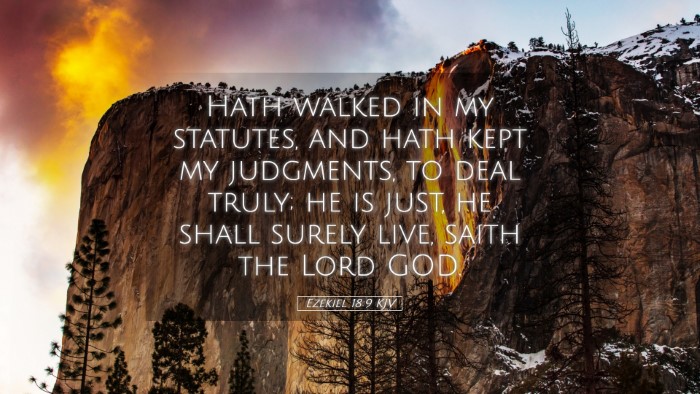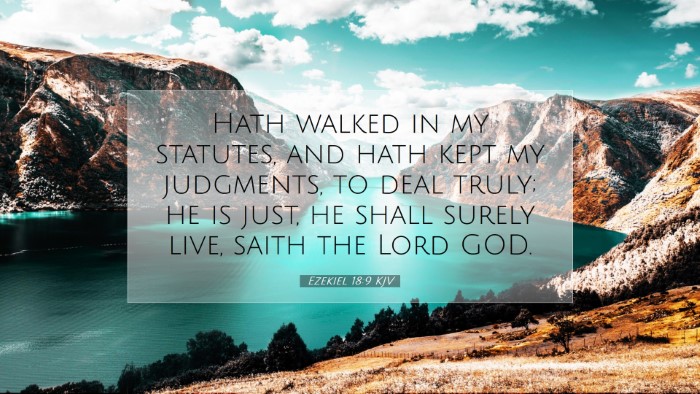Commentary on Ezekiel 18:9
Verse: "He walks in My statutes and keeps My judgments faithfully—he is righteous; he will surely live!” declares the Lord God.
This verse encapsulates a key theme in Ezekiel's prophetic message, emphasizing the importance of personal righteousness and obedience to God's commandments.
Contextual Overview
The book of Ezekiel addresses the spiritual state of the Israelites during their Babylonian exile. The prophet Ezekiel was tasked with calling the people back to God through a message of repentance and renewal. In Ezekiel 18, the focus is on individual responsibility, moving away from the notion of collective guilt inherited from previous generations.
Key Themes
- Individual Responsibility: Each person is accountable for their own actions, regardless of familial or societal influence.
- The Nature of Righteousness: Righteousness is defined by adherence to God's commands and statutes, leading to life and blessing.
- The Promise of Life: A life of righteousness results in divine approval and the assurance of life—both physically and spiritually.
Insights from Matthew Henry
Matthew Henry, in his commentary, underscores the principle of justice inherent in God's laws. He observes that the individual who walks in the ways of the Lord demonstrates their commitment to His statutes. Henry articulates that true righteousness involves a continuous dedication to understanding and fulfilling the divine commandments.
He further comments on the phrase “he is righteous,” pointing out that this is not merely a declaration but also a condition that God acknowledges. Such righteousness is not based on one's heritage or status but rather on the individual’s choices and actions in aligning with God’s will.
Insights from Albert Barnes
Albert Barnes enriches the understanding of this verse by emphasizing that the phrase “surely live” extends beyond mere physical existence. To Barnes, living in this context refers to a deeper, more profound existence that involves a relationship with God—a spiritual vitality resulting from obedience.
Barnes also highlights that the word “walks” signifies continual, habitual action. It suggests a lifestyle of following God's precepts where one's daily life reflects a commitment to uphold divine duties. This paradigm shifts the focus from mere confession of faith to an active and dynamic demonstration of faith through righteous living.
Insights from Adam Clarke
Adam Clarke provides a poignant analysis of the implications of divine judgment entailed in this verse. He argues that the assurance of life for the righteous should serve as a powerful incentive for moral conduct. Clarke points out that Ezekiel articulates this promise to remind the people of the blessings tied to faithfulness to God’s law.
Additionally, Clarke notes the passage's existential appeal, suggesting that a life grounded in God's statutes leads to a genuine fulfillment that transcends temporal circumstances. The righteous individual is portrayed not only as living free from condemnation but also as thriving in a divine partnership shaped by obedience.
Theological Reflection
This verse profoundly challenges contemporary readers to reevaluate their understanding of righteousness in the light of Scripture. The clear call for personal accountability resonates strongly, as it underscores that all individuals, regardless of background or previous wrongdoing, can access God's grace through repentance and sincere obedience.
The ethical implications are enormous. Believers are encouraged to actively embody God's commands in their lives rather than defaulting to a passive adherence to religious practices. This active engagement reflects a living faith that not only seeks God’s mercy but also demonstrates an earnest desire for holiness.
Practical Application
- Encourage Personal Reflection: Pastors and leaders can urge their congregations to reflect on their own walks with God and assess how well their lives align with biblical statutes.
- Teach on Divine Justice: Sermons can focus on the nature of God's justice as revealed in Ezekiel, highlighting the importance of individual action rather than inherited guilt.
- Foster Accountability: Create environments within church communities that encourage mutual accountability and support in pursuing righteousness.
Conclusion
In Ezekiel 18:9, God’s declaration of life promised to the individual who chooses righteousness serves as an enduring reminder of the transformative power of faithful obedience. Through insights from Matthew Henry, Albert Barnes, and Adam Clarke, we glean deeper theological and practical meanings. This verse challenges each believer to live out their faith actively, indicating that a righteous life is not only a personal responsibility but also a pathway to experiencing God’s eternal blessings.


